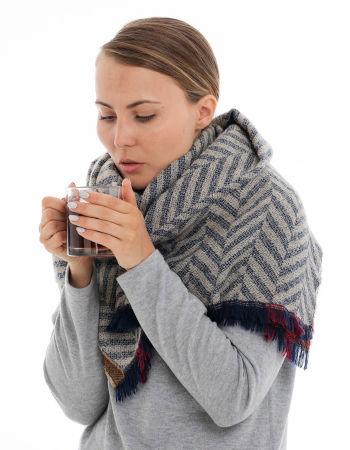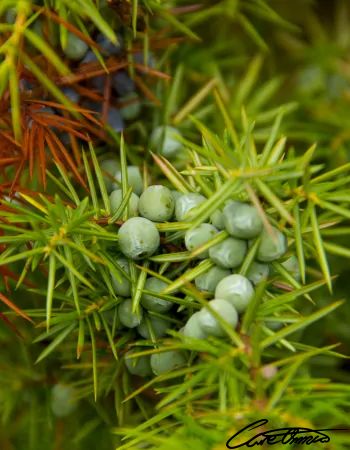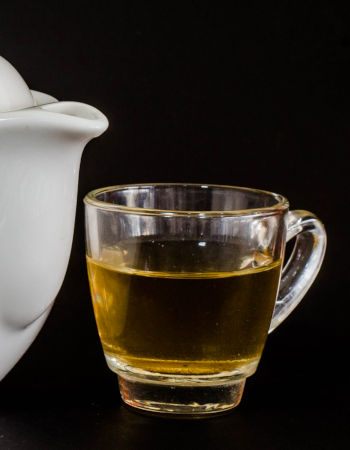We are reader-supported. When you buy through links on our site, we may earn an affiliate commission. Learn more
Juniper Berry Tea: Potent Benefits But Not For Everyone

Juniper berries have been used for centuries as a natural remedy.
The berries are commonly used dried in food, as a tea, mixed with other herbs, or made into juniper oil.
But juniper berry tea isn't something you should gulp down for fun. It's a very potent drink that should be used with caution.
To make a juniper berry tea, you use the dried berries.
You crush them lightly to get out all the benefits and flavors.
The outer scales of the berries are relatively flavorless, so they are almost always at least lightly crushed before being used.
Then you just pour on hot water.
You can find two recipes for juniper berry tea further down in this article.
Table of Contents
Benefits Of Juniper Berry Tea
Juniper berry tea is a very potent drink that should be used with caution.
Juniper berry tea is most commonly brewed of the berries.
This means that all the benefits you find in the juniper berries you also find in your tea.
There is research to be found on juniper berries and it's effects, but the research is somewhat lacking. (source ◳)
Juniper berries have a long tradition as a medicinal plant.
For instance juniper berries have been proven to help with suddenly swollen joints, against urinary tract problems, colds and cough.
It's an important medicinal plant which isn’t fully understood.
Its traditional use for treating diseases and the presence of many active chemical constituents that are responsible for various medicinal and pharmacological properties makes it an interesting and perhaps very potent natural remedy.
Researchers are unanimous that more research is needed in this area. (source ◳)
Ripe or unripe berries matter
To fully use juniper berries for it’s healing properties choose the green berries, the unripe ones.
This is because the green berries contain most of the powerful oils, which are responsible for most of the effects that the berries has.
Juniper berries are very potent and the effects of it can be quite quick.
But you should use them with caution.
Juniper is highly diuretic
Juniper berry tea is highly diuretic and can help against urinary tract infections and sudden swelling of the joints.
Such swelling occurs usually because uric acid crystals are stuck in the joint. When this happens the blood can't flow through, so the joint swells and starts to hurt, a lot.
Juniper berry tea can help the body flush the uric acid so the swelling can go down.
If you are interested in learning more about the benefits of juniper berries I recommend you read our article named What Are Juniper Berries Good For?.
What Juniper Berries Can I Use For My Tea?

There are about 60 different juniper species, all of them are not edible.
Juniper berries contain a powerful oil called Thujone.
Thujone can cause upset stomach, give diarrhea, and cause kidney problems when ingested in large quantities.
Junipers that are regarded as safe to eat have low amounts of the oil thujone. (source ◳)
Juniperus communis is the most commonly used juniper and the one that is regarded as the safest. Many think that other varieties are often too bitter to eat.
There are a few other varieties that are considered safe to eat, like Juniperus Drupacea, Juniperus Phoenicia and Juniperus Californica.
Toxicity of Juniper berries
You should never eat the berries of Juniperus Sabina or as it's also called Savin Juniper.
If the oil in the Savin Juniper is ingested the outcome can be fatal.
Ingested in small quantities can in best case lead to irritation of the mouth, diarrhea, vomiting, pain in stomach and colic's. (source ◳)
There are a few other Junipers that should be avoided altogether because of the possibility of toxicity like, Juniperus Polycarpus, Juniperus Virginia and Juniperus Thurifera.
When picking Juniper berries to your tea, be sure which Juniper it is! If you’re not 100% sure, don’t use it.
We have an article about Juniper and its toxicity named Are Juniper Berries Poisonous? When Should I Avoid Them? if you're interested to learn more.
Juniper Berry Tea As A Cure?
Juniper berry tea is so potent that you should only drink it as a medicine for a limited time.
You should not use it regularly or everyday.
But you can use juniper berry tea as soon as symptoms begin to appear of a cold, cough or urinary tract infection provided you follow the dosages below and you have no underlying illnesses.
Juniper berry tea has a fresh taste and aroma that’s best described as a sweet mix with resin and forest.
If you drink it every day for a longer period, not just as a cure, you can damage your body.
The kidneys can get overstimulated, which can lead to bigger issues in the long run.
Seizures and kidney damage have been reported in individuals who took more than 10 g of Juniper per day or who took high doses of Juniper for longer than 4 weeks.
The method and form of administration is however not specified in the report. (source ◳)
Juniper Berry Tea As Medicine (Recipe)
Because juniper berries are so strong, you shouldn’t drink more than one cup of tea a day and not longer than a week, and certainly not if you are pregnant or have kidney problems.
Juniper berry tea recipe
- Take 1 teaspoon of dried juniper berries and lightly crush them to release flavors and oils
- Pour the lightly crushed juniper berries in a cup of hot water
- Let your tea rest under a lid for 5-10 minutes
- Strain and drink hot
You can vary the amount of water you use to get the taste you want.
But be careful with the amount of juniper berries you use as they are quite potent.
Juniper Berry Tea As Cough Medicine (Recipe)
You can also make a very effective cough medicine of juniper berries.
Coughing helps to get rid of the mucus, but if your cough is troublesome in the evening when going to sleep, it can be good to be able to relieve it.
The juniper will suppress your cough reflex.
If you are looking for a herb tea that works during the day it’s better to choose a herb that has expectorant properties, for example, red clover or linden flowers.
During the day it’s better to use expectorant rather than a cough suppressant.
Cough medicine with juniper berries
- Take a tablespoon of green, dried juniper berries and lightly crush them to release flavors and oils.
- Pour the lightly crushed juniper berries into a pot with a pint of water
- Cook under a lid for 5-10 minutes.
- Strain it.
- Allow the tea to cool to 113°F (Fahrenheit) or 45°C (Celsius).
- Stir in 150 grams of honey and pour it into a dark glass bottle.
- Take a tablespoon whenever needed, for cough. Especially smart to take before bedtime.
You can safely store it in the fridge for a few months.
As with the tea above we recommend you vary the amount of water and the honey you use to get the taste you want.
But please be careful with the amount of juniper berries you use as they are quite potent.
When You Shouldn't Use Juniper Berries
Always avoid juniper berries and juniper oil if you have severe kidney problems, such as kidney inflammation.
Already at normal doses, juniper berries have a strong impact on the kidneys and can cause increased strain on them.
Juniper shouldn’t be used by pregnant women as it can cause contractions in the uterus.
It's believed to be the ethanolic extract of juniper berries that has demonstrated clear abortifacient effects.
Historically, juniper has a reputation as an abortifacient. (source ◳)
Juniper berries of the right kind is safe for most adults when taken orally in medicinal amounts for a short term or when inhaled as a vapor or when applied to the skin in small areas.
However, eating juniper berries for a long time or in high doses can be unsafe and cause kidney problems and irritation of the gut.
People with high blood pressure should also avoid juniper berries.
They can affect blood pressure and make it’s control more difficult. (source ◳)
Be careful with Juniper berry tea, even if you only use it as a cure
Excessive use of juniper berries or continued use may produce renal irritant effect particularly when the urinary tract is inflamed.
Therefore, the medicinal use of juniper is no longer recommended for the treatment of various disorders, when the patients have an underlying renal cause. (source ◳)
Alternatives To Juniper Berry Tea

There are alternatives to Juniper berry tea if you can’t or simply choose not to drink it.
As stated above juniper berry tea can help alleviate colds, cough, swollen joints and urinary tract infections.
Juniper berry tea alternatives for cold
There are many different alternatives that you can use instead of juniper berry tea when you’re experiencing the first symptoms of a cold.
There is no cure for a cold.
But there are ways to alleviate some of the symptoms.
Alternative 1: Elderberry Syrup
Elderberry syrup is very popular and has been proven to work in alleviating symptoms and even reducing time of sickness. (source ◳)
Remember: There is a toxicity risk when taking elderberry syrup. All elements of the elderberry plant, contain toxic elements.
Only cooking and other forms of processing can render the berries safe for consumption.
You can read more about the health benefits of elderberry syrup in our article named What Is Elderberry Syrup Good For? Does It Really Work?
Alternative 2: Apple Cider Vinegar
A second alternative to juniper is apple cider vinegar.
Apple cider vinegar is becoming a more and more popular home remedy for colds.
It has a high concentration of vitamin C, fiber, and the acids are believed to boost immunity while breaking up the congestion that comes with a cold. (source ◳)
Additional natural remedies for cold
If you're interested in even more alternatives for combating cold, we got an article with several natural home remedies for the common cold.
There might not be a cure for the cold but there sure are ways to alleviate the symptoms and also shorten the duration.
Juniper berry tea alternative for cough
Lemon tea with honey is a great alternative for alleviating cough.
According to research honey can actually relieve coughs more effectively than over-the-counter medicines that contain cough suppressants. (source ◳)
Lemon is antiseptic and together with the honey you got a perfect combination.
Just remember not to heat the honey too much. Heat destroys the enzymes in the honey.
Heating honey to a maximum of 185°F or 85°C is ok but I seldom go above 159°F or 70°C as I want to be absolutely sure that I leave the health benefits of the raw honey intact.
Important: Don't serve anything with honey to children younger than 1 year. It can cause infant botulism. Read more at The World Health Organization. (source ◳)
My cough beverage recipe

When me or someone in my family has a cough I always serve them my easy to make but effective cough beverage
that's based on honey and a touch of lemon.
Here's how to make it:
- Boil water
- Pour in a cup
- Squeeze some fresh lemon or lemon concentrate into the cup (for balancing the sweetness of the honey)
- Let it cool down so it's cold enough for you to be able to drink it
- Add a teaspoon or two of honey
It's so simple that you can make it even if you're the one who's sick!
Not everyone enjoy it as much as I, but they drink it because it helps and who doesn’t want to feel better when feeling ill.
You can experiment with how much honey or lemon you add to find the mix that suits your taste.
If you want to make your own, I recommend you get this great tasting 100% Pure, Raw and Unfiltered Honey #ad that's available through Amazon.
It comes in a convenient bottle as well.
Juniper berry tea alternatives for swollen joints
There are many different reasons why a joint may swell.
It’s important for a physician to take a look and see what the problem might be.
Please be sure to consult with a health professional before you do anything else.
If the swelling occurs because uric acid crystals are stuck in the joint, there are no great alternatives for Juniper berry tea (foods etc.).
As I've written earlier in this article juniper berry tea works by flushing the system and helps get rid of the uric acid all together.
But research shows that certain foods can help you avoid accumulating uric acid crystals in your joints.
These foods might help you prevent it from happening again.
Protective foods
Foods that are believed to act as a protective against elevated uric acid (source ◳)
- Coffee
- Low-fat dairy products, particularly yogurt
- Foods with high vitamin C content
- Cherry or lemon juice
- Soy and lentils
Juniper berry tea alternative for urinary tract infection (UTI)
Cranberry or lingonberry juice are very effective alternatives to juniper berry tea.
There is a substance called tannins that you can find in both cranberries and lingonberries.
Lingonberries, however, have a higher concentration of the substance than the cranberries.
Research shows that tannins are effective against urinary tract disorders.
For instance in a Finnish study presented in the British Medical Journal, where women drank cranberry and lingonberry juice for a year. (source ◳)
I myself often take cranberry or lingonberry juice as soon as I feel just the smallest symptom of UTI.
I feel the effects of it working already the next day but it’s very important for you to go to your physician if the symptom's doesn’t disappear or if they get worse.

With juniper berry tea you’re limited to a cup per day, but with lingonberry or cranberry juice you can drink as much as you want! I recommend drinking it with your meals. It’s delicious!
I always have lingonberry juice at home. Our kids drink it instead of soda.
And just as with soda they can gulp down a bottle in no time.
So I've learned to keep one bottle "hidden".
For me, UTI symptoms seem to always come when the stores are closed and as it's so effective I don't want to loose a whole night before I start treating it. It's feels better to be prepared.
If you like me want to be prepared I recommend this delicious lingonberry juice #ad available through Amazon.
You get two bottles, one to enjoy and one to hide away until the time comes when you need it.
Conclusion: Juniper Berry Tea Has Amazing Benefits But Be Careful
Juniper berry tea has been proven through research that it works in alleviating some problems like urinary tract infection.
But it’s a very powerful berry.
If you drink it every day for a longer period, not just as a cure, you can damage your body.
You need to be careful with Juniper berry tea and avoid drinking more than one cup a day for not longer than one weeks.
This because juniper berries have a strong impact on the kidneys and can cause increased strain on them.
If you are pregnant or have any underlying renal disorder you should stay away from Juniper berry tea and the berries themselves altogether.

